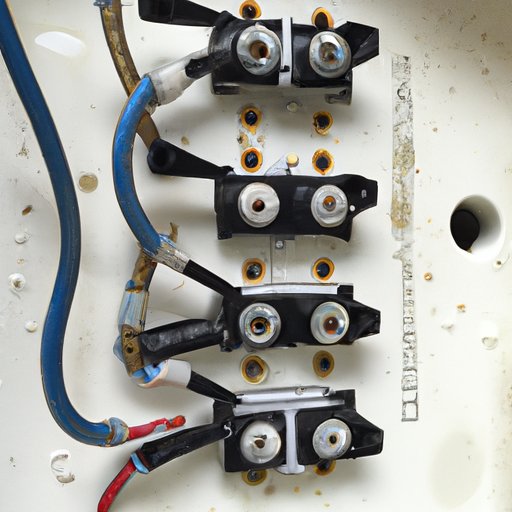Introduction
When it comes to laundry, having a dryer that works efficiently and effectively is key. Whether you have a gas or electric dryer, understanding how each one operates is essential for proper use and maintenance. In this article, we’ll discuss how to tell if your dryer is gas or electric so you can better understand its functions.
A gas dryer uses natural gas or propane as fuel to heat air, while an electric dryer uses electrical resistance coils to heat air. Both types of dryers work by circulating heated air through wet clothes to remove moisture from them. Depending on the model, either type can be more energy-efficient than the other.
Understanding what type of dryer you have can help you determine the best maintenance and repair methods. Read on to learn how to tell if your dryer is gas or electric.
How to Tell if Your Dryer is Gas or Electric
The most reliable way to know what type of dryer you have is to consult the manufacturer’s label or manual for specifications. If you don’t have access to the paperwork, there are several ways to identify a gas or electric dryer.
Check the Manufacturer’s Label/Manual for Specifications
If you still have the original product manual or sales receipt, check the documents for information about the dryer’s type. This is the most reliable source of information, since it will provide accurate details about the make and model of the dryer.
Look Inside the Dryer to Find the Gas Line Connection
If you can access the interior of the dryer, take a look inside and locate the gas line connection. On some models, the dryer’s gas valve may be located on the back panel, but if your dryer is a gas model, you should see a clear connection for the gas line running into the drum.
Inspect the Exterior of the Dryer for a Gas Line Hookup
If you don’t have access to the interior of the dryer, you can inspect the exterior for signs of a gas line hookup. You should see a flexible metal tube running from the wall to the back of the dryer, connected to the gas shut-off valve. This indicates that the dryer is a gas model.
Check the Back Panel of the Dryer for a Gas Connection
If you can access the back panel of the dryer, look for a gas connection. This will be a small, brass-colored valve with a threaded end, where the gas line attaches to the dryer. If you find this connection, then your dryer is a gas model.
Look for a Pilot Light or Igniter on the Interior of the Dryer
On gas dryers, you should also see a pilot light or igniter near the gas valve. This is a small, glowing device that ignites the gas when the dryer is turned on. If you don’t see this device, then it’s likely that your dryer is electric.
Listen for Any Gas Hissing Sounds Coming from the Dryer
If you turn on the dryer and hear a faint hissing sound, this could indicate that the dryer is a gas model. The sound is caused by the gas flowing through the valve, and it should stop once the dryer has been in operation for a few minutes.
Look for an Electric Plug Cord Attached to the Rear of the Dryer
If your dryer doesn’t have a gas line connection and you don’t hear any hissing sounds, then it’s likely that your dryer is electric. To confirm, check the rear of the dryer for an electric plug cord. If you find one, then your dryer is definitely electric.
Conclusion
Figuring out if your dryer is a gas or electric model isn’t always easy, but with a few simple steps, you can determine the type quickly and accurately. Check the manufacturer’s label or manual for specifications, look inside the dryer for a gas line connection, inspect the exterior for a gas line hookup, check the back panel for a gas connection, look for a pilot light or igniter inside the dryer, listen for any hissing sounds coming from the dryer, and look for an electric plug cord attached to the rear of the dryer.
By following these tips, you can easily and accurately identify whether your dryer is gas or electric. Knowing which type of dryer you have can help you determine the best maintenance and repair methods, ensuring that your dryer runs efficiently and effectively for years to come.


